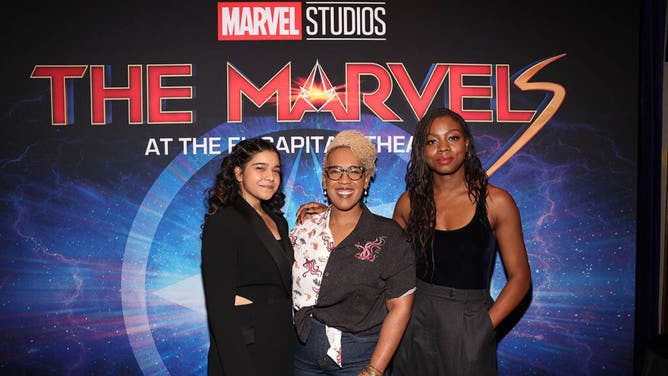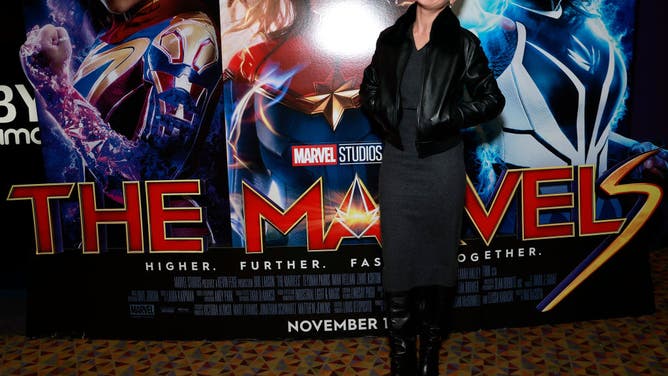‘The Marvels’ Director Blames 'Virulent And Violent And Racist And Sexist And Homophobic' Americans For Film's Failures
The latest film in the Marvel Cinematic Universe (MCU), The Marvels, opened to a weekend box office of just $47 million, the lowest in franchise history.
Yet outlets like The Associated Press called the film a success anyway, by virtue of being the first MCU release directed by a black woman.
The director, Nia DaCosta, seems to agree.
This week, she blamed the lack of interest in the film and its subsequent criticism on the bigotry of Marvel fans.
"There are pockets that are really virulent and violent and racist — and sexist and homophobic and all those awful things," she told Variety’s Angelique Jackson when asked about the film going "woke."
"And I choose the side of the light. That’s the part of fandom I’m most attracted to.”
Virulent, violent, racist, sexist and homophobic, huh?
What a combination, one MSNBC is almost certainly to adopt shortly.
There's a trend
Disney films no longer capture the pulse of moviegoers. Before The Marvels, the studio's last eight films combined for more than $900 million in losses.
The films, most of which are designed for children, have recently included same-sex kissing and non-binary characters.
The viewers -- including parents -- have rebelled against the inclusion of such messaging. Obviously.
Yet instead of acknowledging the failures of espousing political values that run afoul of the customer base, Disney actors and directors have chosen to chastise their customers.
Or former customers, that is.

LOS ANGELES - (L-R) Iman Vellani, Angelique Roche and Nia DaCosta attend THE MARVELS Fan Screening Surprise Talent Appearance at El Capitan Theatre in Hollywood, California on November 9. (Photo by Jesse Grant/Getty Images for Disney)
DaCosta echoed the same sentiment that Mark Ruffalo did last year when he attributed racism and sexism to the failures of “She-Hulk: Attorney at Law,” a Disney+ series in which he co-lead.
It's your fault Disney is failing, says Ruffalo.
The lack of interest in The Marvels is quite self-explanatory.
First, Disney promoted the film by celebrating that it chose a black female director and three female leads — a white woman, a black woman, and a Pakistani woman.
Those are not exactly causes for most Americans to buy a movie ticket. Moviegoers don't care about the skin color of the director. Rather, they care about the synopsis of the film.
And the synopsis wasn't all that interesting either:
"Carol Danvers, aka Captain Marvel, has reclaimed her identity from the tyrannical Kree and taken revenge on the Supreme Intelligence. However, unintended consequences see her shouldering the burden of a destabilized universe. When her duties send her to an anomalous wormhole linked to a Kree revolutionary, her powers become entangled with two other superheroes to form the Marvels.”
No wonder the film set an all-time MCU low.

NEW YORK - Brie Larson attends THE MARVELS Movie Theater Pop-In on November 10. (Photo by Jason Mendez/Getty Images for Disney)
OutKick's Ian Miller put the trajectory of the franchise into perspective his week:
"For more than a decade, Marvel was essentially untouchable. Their Cinematic Universe plan was flawlessly executed, with interlocking storylines weaving together recognizable, beloved characters. The Avengers series brought those storylines together to a generally satisfying conclusion.
"But after completing those projects, Marvels lost much of what made it successful. The laser focus on key characters was abandoned in favor of checking diversity, equity and inclusion boxes. Charismatic performers like Robert Downey Jr. were replaced with Brie Larson’s Captain Marvel. And while the first Captain Marvel film was a box office success, reviews for Larson’s performance were mixed, to say the least.
Despite the generally poor reception, Disney committed significantly more money to the sequel, while handing the reins over to an inexperienced director, Nia DaCosta. Giving $270 million to DaCosta, coming off a film festival success and a poorly rated horror film, was, as many predicted, a very bad idea."
Then again, calling fans "virulent and violent and racist — and sexist and homophobic” probably is a better excuse.